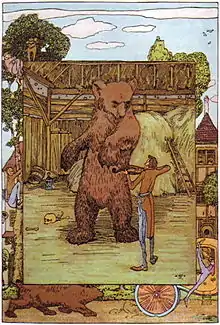The Clever Little Tailor
"The Clever Little Tailor" (German: Vom klugen Schneiderlein) is a German fairy tale collected by the Brothers Grimm as tale 114. It is Aarne-Thompson type 850, The Princess's Birthmarks. Andrew Lang included it in The Green Fairy Book.

Synopsis
A proud princess set a riddle to her wooers and sent them away when they could not answer. Three tailors came. Two were known for their cleverness and skill, and the third for his uselessness. The princess asked them what two colors were her hairs. The first said black and white; the second brown and red; the third gold and silver, and he was right.
The princess demanded that he spend the night with a bear as well. In his stall, the tailor began to crack nuts. He offered the bear not nuts but pebbles, and the bear could not crack them. The tailor took one away, substituted a nut, and cracked it. The tailor began to fiddle, and the bear danced. The tailor offered to teach it, but first he had to cut its nails. He trapped it in a vise and left it there.
The princess agreed to marry him. The other two tailors freed the bear. It came after the carriage. The tailor stuck his legs out the window and threatened the bear with the claim that they were a vise. It ran off.
Analysis
Professor Stith Thompson classified the tale type as Aarne-Thompson-Uther ATU 850, "The Birthmarks of the Princess".[1]
Variants
Stith Thompson suggested the tale type originated from genuine European oral folklore, since an ancient literary version is not attested. He also stated that variants are "told all over Europe".[2]
Slavic-speaking Area
August Leskien claimed that that this "Märchenkreis" is very widespread in Slavic tradition, with the same plot: the princess sees the dancing animals (sheep, pigs, etc.) of a peasant who plays a musical instrument (flute, violin, etc.) and is interested in buying the animals, in exchange for showing her birthmarks.[3]
References
- Thompson, Stith (1977). The Folktale. University of California Press. pp. 155-156. ISBN 0-520-03537-2.
- Thompson, Stith (1977). The Folktale. University of California Press. pp. 155-156. ISBN 0-520-03537-2.
- Leskien, August/Brugman, K. Litauische Volkslieder und Märchen. Straßburg: Karl J. Trübner, 1882. p. 536.